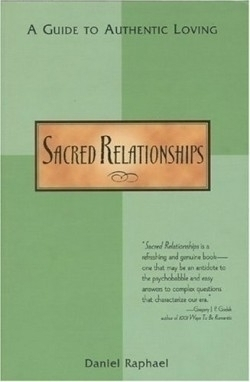Sacred Relationships
A Guide to Authentic Loving
Bringing human relationships, with their intimacy and intricacies, in alignment with a definitive theological view of the universe is the goal set forth in Daniel Raphael’s Sacred Relationships. Raphael, small business owner and University of Metaphysics Ph.D., wastes no time in launching into his premise and leaves no room for misinterpretation in terms of its implications. In the words of the author, Sacred Relationships is “a developmental guide for personal spiritual growth.” Concurrently, the book identifies the criteria for a sacred spiritually anchored relationship, while attempting to prepare one for initiating and sustaining a bond of such proportions. Raphael’s personal belief that the purpose of life is “growing into a sacred and harmonious relationship with God and the universe,” emerges, however, as the book’s genuine preoccupation. In order to achieve this goal, the author asserts one must first master living in harmony with those bound to this material plain of existence—with friends, co-workers and lovers alike.
Hinging on this premise the book proceeds to slalom through varied psychological fundamentals, self-help techniques and personal inflection. The majority of the book’s three parts is devoted to preparing the individual for the emotional challenge of conscientiously devoted relationships. The balance of the content focuses on elements of a functional and “sacred” relationship. Offering insights into relationship ethics and maintenance, trust, distrust, happiness, discontent, the birthing of a relationship and its possible death.
It is noteworthy to mention that in addition to its official classification as dealing with personal growth and interpersonal relations, sacred relationships is very much a function of its religious convictions. The decidedly Christian metaphysical overtones may alienate some, despite brief acknowledgements of other faiths. Although the writing style remains accessible and light throughout, it often borders on unrealistic optimism, as in certain illustrative relationship scenarios. The book persists as a rather buoyant conglomerate of basic psychological concepts and self-help “wisdoms” that are not too far removed from common knowledge. Raphael does, however, offer several universal perceptions that stand independent of any specific religious end they may be employed to reach—the qualities and values characteristic of a healthy relationship and some insight into emotional health. Ultimately, Sacred Relationships aids in identifying personal and interpersonal undercurrents, which in any spiritual realm, invites perpetual restlessness.
Reviewed by
Karen Wyckoff
Disclosure: This article is not an endorsement, but a review. The publisher of this book provided free copies of the book to have their book reviewed by a professional reviewer. No fee was paid by the publisher for this review. Foreword Reviews only recommends books that we love. Foreword Magazine, Inc. is disclosing this in accordance with the Federal Trade Commission’s 16 CFR, Part 255.

